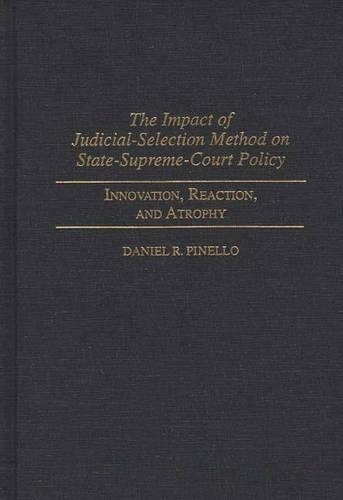
The Impact of Judicial-Selection Method on State-Supreme-Court Policy: Innovation, Reaction, and Atrophy
(Hardback)
Publishing Details
The Impact of Judicial-Selection Method on State-Supreme-Court Policy: Innovation, Reaction, and Atrophy
By (Author) Daniel R. Pinello
Bloomsbury Publishing PLC
Praeger Publishers Inc
24th October 1995
United States
Classifications
Tertiary Education
Non Fiction
Private or civil law: general
Legal systems: courts and procedures
Political science and theory
347.307752
Physical Properties
Hardback
248
Description
This unique empirical study investigates how the method of judicial selection significantly affects state-supreme-court policies in several important areas of lawbusiness, criminal procedure, and family law. After examining different theories and surveying the research about judicial selection, this comparative study of policies in six statesConnecticut, New Jersey, Pennsylvania, Rhode Island, Virginia, West Virginiachallenges current assumptions. The author finds that appointed judges prefer the interests of the individual over those of the state in criminal-procedure cases and are the most innovative in business law; that elected judges prefer the interests of the state over the individual; and that legislatively selected judges acquiesce to the policy preferences of other branches of government and are the most inactive in terms of policy initiation. For students and teachers in law, political science, and history; for lawyers and judges; for interest groups concerned about state policy; and for policymakers and other professionals concerned with American government and public administration.
Reviews
"Pinello's research mounts a serious challenge to the widely held notion that selection system is not very relevant to policy outcomes....[It] makes a significant contribution because it shows us how to obtain answers to this decades-old question about the linkage between selection system and judicial policy."-The Law and Politics Book Review
Overall, he finds relationships that confirm most of his hypotheses and support the claim that how judges are chosen makes an important difference in what they do on the bench. His discussion regarding legislatively selected judges as passive policymaking is especially interesting and suggestive since there are only three states that use this method of selection and there has been very little previous research on these courts.-American Political Science Review
Pinello's research mounts a serious challenge to the widely held notion that selection system is not very relevant to policy outcomes....[It] makes a significant contribution because it shows us how to obtain answers to this decades-old question about the linkage between selection system and judicial policy.-The Law and Politics Book Review
"Overall, he finds relationships that confirm most of his hypotheses and support the claim that how judges are chosen makes an important difference in what they do on the bench. His discussion regarding legislatively selected judges as passive policymaking is especially interesting and suggestive since there are only three states that use this method of selection and there has been very little previous research on these courts."-American Political Science Review
Author Bio
DANIEL R. PINELLO is Assistant Professor of Government at John Jay College of Criminal Justice at the City University of New York.
